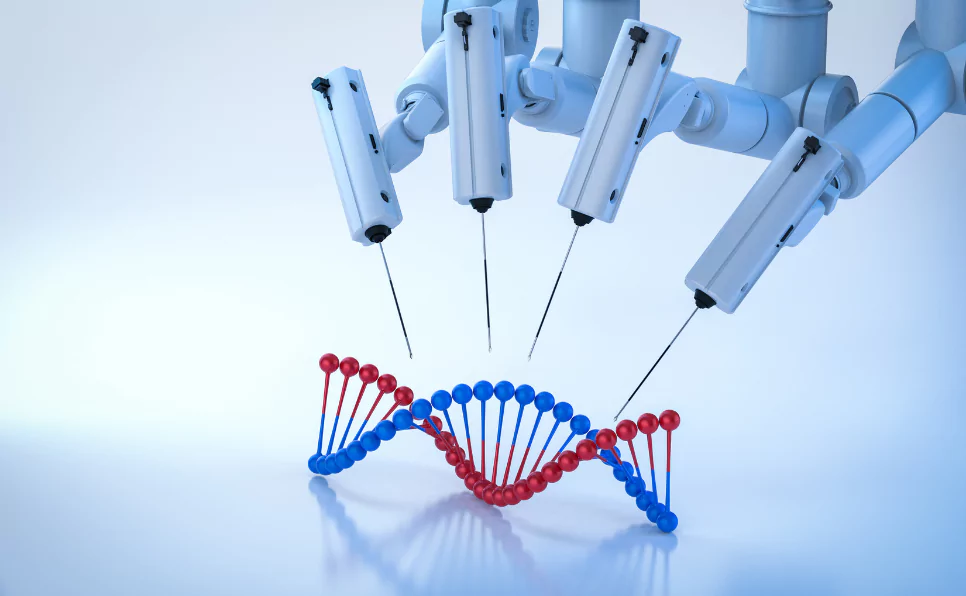Artificial intelligence, or AI, can sift through loads of data like DNA sequences, pictures from medical scans, and patient health records. It’s a pretty useful tool that helps researchers and doctors make sense of diseases, especially rare ones linked to our genes, by spotting patterns that we humans might miss.
One way we use AI in studying genes is to spot changes in our DNA that might cause diseases. These changes can impact how genes and proteins function. Some of these changes don’t really affect our health, while others could make us more likely to get certain diseases or respond differently to treatments.
The problem is, it’s not easy to figure out which changes in DNA can cause diseases, especially when you have millions of possibilities. It takes a lot of computing power and knowledge about biology. Plus, many diseases are caused by a bunch of genes and factors in our environment, which makes it even harder to pinpoint exactly what’s going on.
To tackle these problems, scientists have come up with ways to use AI that can combine different kinds of data and learn from them to find important links between our genes and diseases. For example, in a recent study, researchers used a mix of deep learning (a type of AI) and a statistical method called Bayesian inference to find genes that might make people more likely to get Alzheimer’s disease. This method uses AI to learn how changes in our DNA relate to changes in brain scans. Then, it uses statistics to figure out how likely it is for each DNA change to be linked to Alzheimer’s disease, based on what we already know from past studies.
The researchers used this method on data from over 800 people, and they found 21 DNA changes that were linked to Alzheimer’s disease. Some of these changes hadn’t been found before. They also tested their findings on another large set of data to make sure their results were valid.
The researchers believe their method is better than existing ones because it’s more accurate and gives more understandable results. They also think it could be used to study other diseases like diabetes, cancer, and schizophrenia.
Another example is an automated system created by Stanford Medicine researchers that uses AI to quickly find genes that might cause diseases in mice. This system can look at over 10,000 sets of data about mouse diseases at once and sift through 29 million research papers to find potential links between genes and diseases. Then, it narrows down the information to identify genes that might be causing a specific disease.
The researchers used their system to find genes that might cause diabetes, obesity, and cataracts in mice. They found several known genes and some new ones that could lead to new treatments. They also showed that their system can cut down the time it takes to find these genes from months to just a few hours.
The Stanford researchers think their system can help scientists use genetics to come up with disease treatments more quickly and accurately. They also hope their system can be used on human data in the future.
AI can also be used to predict if someone might get a disease based on their genes. Researchers from Rutgers University used AI to predict heart disease in patients by looking at their DNA sequences. They trained their AI model on data from over 1,700 patients and tested it on data from another group of nearly 900 patients. Their model could predict two types of heart conditions with 83% and 88% accuracy, which is better than methods that just look at common risk factors.
The researchers believe their model can help doctors identify patients at risk of heart disease earlier and provide personalized treatment. They also think their model could be used for other diseases that are linked to our genes, like cancer and Alzheimer’s disease.
Overall, using AI to study the link between genes and diseases is a promising approach. It could help us find new disease-causing genes, predict who might get a disease, and create personalized treatments. However, this approach also has its challenges, like ensuring data quality, making sense of the results, and dealing with ethical issues. More research and collaboration are needed to tackle these issues and make sure we can use AI safely and effectively in studying diseases.
References:
- https://scopeblog.stanford.edu/2022/06/10/using-ai-to-find-disease-causing-genes/
- https://genomemedicine.biomedcentral.com/articles/10.1186/s13073-019-0689-8
- https://www.sciencedaily.com/releases/2023/02/230227132723.htm
- https://www.sciencedaily.com/releases/2019/06/190606133805.htm

Dr. Sumeet is a seasoned geneticist turned wellness educator and successful financial blogger. GenesWellness.com, leverages his rich academic background and passion for sharing knowledge online to demystify the role of genetics in wellness. His work is globally published and he is quoted on top health platforms like Medical News Today, Healthline, MDLinx, Verywell Mind, NCOA, and more. Using his unique mix of genetics expertise and digital fluency, Dr. Sumeet inspires readers toward healthier, more informed lifestyles.





